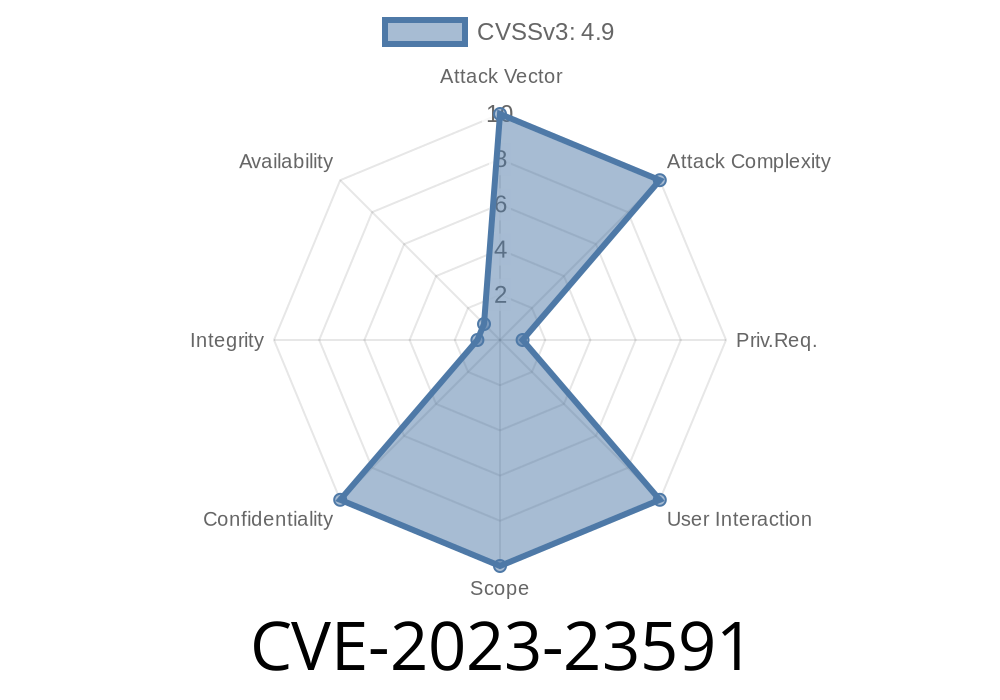> Summary:
A critical vulnerability (CVE-2023-23591) was discovered in Terminalfour’s Logback logging component. This flaw puts sensitive user and application data at risk by exposing it in server logs when debug mode is enabled. Here’s everything you need to know, including code samples, details of the exploit, and how to keep your systems safe.
What is Terminalfour and Logback?
Terminalfour is a web content management system widely used by universities, government, and other organizations. Like many Java applications, it uses the Logback library to handle application logging—from errors to debugging messages.
About CVE-2023-23591
The vulnerability, assigned CVE-2023-23591, was found in versions of Terminalfour before 8.3.14.1. It allows OS-level administrators to read sensitive information from server log files if the application runs with debug-level logging on.
Root Cause:
When debug logging is turned on, Logback records too much information—including request parameters, session details, and sometimes even authentication tokens or passwords—straight into unrestricted logs.
Exploit Details
This vulnerability is not a remote code execution or injection flaw, but it can be just as serious in the right hands. An attacker doesn’t need to send any special payload—they just need access to read server logs.
Terminalfour, through Logback, writes extensive request and session data to logs.
3. A privileged user (for example, an OS administrator or someone with log file access) can read these files.
Sample Log Snippet (Vulnerable)
// logback.xml - debug enabled
<configuration>
<root level="DEBUG">
<appender-ref ref="FILE"/>
</root>
</configuration>
Log file sample:
2023-12-02 10:03:39 DEBUG Request: /login, Params: {username=admin, password=hunter2}
2023-12-02 10:03:39 DEBUG Session ID: 3fcad8... User: admin
Step-by-Step Example
Imagine a university IT administrator turns on debug logs to solve a minor bug. Weeks later, someone with read access to /var/log/t4/application.log discovers:
DEBUG [User login] User: jsmith, Password: P@sswrd!
This person could now impersonate users or escalate privileges—without ever interacting with the Terminalfour web interface.
How to Fix
1. Upgrade Immediately
8.3.14.1
2. Disable Debug Logging
Unless absolutely necessary, never run production systems with debug or trace log levels.
Example of Safe logback.xml
<configuration>
<root level="INFO">
<appender-ref ref="FILE"/>
</root>
</configuration>
3. Restrict Log File Access
Tighten filesystem permissions
# Linux example
chmod 600 /var/log/t4/application.log
chown t4app:t4group /var/log/t4/application.log
4. Scrub Old Logs
If debug mode was on, review and delete old logs that might contain sensitive info.
References and Further Reading
- Official Terminalfour Advisory
- CVE-2023-23591 on NIST
- Logback Documentation
Conclusion
CVE-2023-23591 doesn’t expose your Terminalfour server to hackers over the network, but anyone with access to your server can potentially harvest user secrets from log files—especially if you debug often. The fix is as simple as upgrading to a patched version and never using DEBUG level logging in production.
_Share this post and bookmark it to keep your organization safe from information leaks in application logs._
Timeline
Published on: 04/12/2023 14:15:00 UTC
Last modified on: 04/19/2023 19:34:00 UTC
